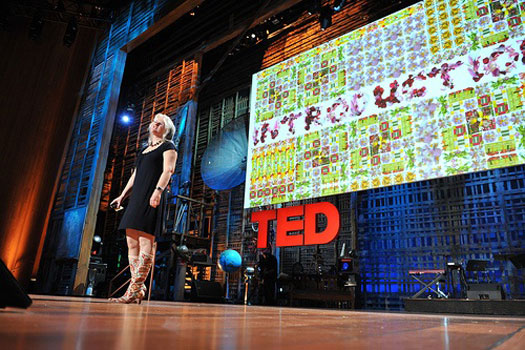
Ukulele virtuoso Jake Shimabukuro performing with ETHEL at TED2010, Long Beach, Calif. Photos: TED/James Duncan Davidson
According to the Nobel prize–winning psychologist Daniel Kahneman, speaking about the slippery concept of happiness, our emotions derive less from our experience of a particular event — for instance, a colonoscopy — than from our recollection of it. The “remembering self is a story-teller,” which is to say, a liar, Kahneman believes. A jolt of pain at the end of a nasty procedure gives rise to a harsher memory than does a mild culmination — even if everything leading up to that final moment is exactly the same. “What defines a story,” Kahneman says, “are significant moments and endings.”
Kahneman occupied a significant moment of the 2010 TED Conference, “What the World Needs Now,” recently held in Long Beach, California. He was the first speaker on the main stage, lead batter in a four-day lineup of such power hitters as the British Conservative Party leader David Cameron (beamed in from the U.K.); cute-in-a-ruffian-way celebrity chef Jamie Oliver; cynically exposed former CIA operative Valerie Plame Wilson; musical cycling activist David Byrne; MIT interface guru John (“Minority Report”) Underkoffler; mosquito-armed philanthropist Bill Gates, this time bearing fireflies; China-sparring Google leader Sergey Brin; autism standard-bearer and Claire Danes performance template Temple Grandin; potty-mouthed anarcho-comedienne Sarah Silverman; sparkle-philic architect David Rockwell; dramatist and patriarchy scourge Eve Ensler; arguably successful filmmaker James Cameron; and a long succession of other players, identified in my notes with such descriptors as “carnivorous plant guy,” “suspended animation guy,” “spider-silk chick,” and “ukulele wonder.”
Let me interrupt myself to point out that the previous sentence has 942 characters (with spaces), 6.7 times longer than the longest tweet. This is not an accident. I am recovering from acute writerly compression. For the first time at TED, I made a serious commitment to Twitter, and it transformed my experience of this famously fast-paced, eclectic event. It’s hard enough to take notes on 18-minute speeches about social networks, moral philosophy, genomics, music-hall acoustics and nuclear proliferation without having to jam those subjects into a tweet in anticipation of the next knot of concentrated profundity issuing from the stage.
And yet, I refused to wait until the breaks so I could tweet in leisurely batches. At TED, tweeting is an extreme sport. No one with an ounce of competitive instinct pauses. Blink and 117 people have posted exactly what you were going to say yourself. Like when Thifhelimbilu Daphney Singo, a South African physics student, poignantly recalled her mother advising, “Education is the husband that will never let you down, my daughter” (66 characters, room for a link!) and suddenly more people were quoting Singo than have ever quoted Mark Twain.
Overwhelmed, overcaffeinated and too proud to abbreviate unless I really had to, I judged TED 2010 through the demands of the 140-character bitch goddess. I loved this year’s theme. Not because “What the World Needs Now” represented TED curator Chris Anderson’s reasonable view that the people in charge of solving global problems are failing abysmally —“At best, things inch along through grubby, murky compromise,” he said — and that fresh, immediate action is needed. No, I loved it because almost every speaker felt obliged to complete the sentence, “What the world needs now is….,” boiling down their insights into lovely dollops of conceptual stock.
“What the world needs now is a much better sense of what our home is” (Carter Emmart, Hayden Planetarium’s director of astrovisualization on new ways of seeing the cosmos). “What the world needs now is for people to admit that there are right and wrong answers” (neuroscientist and philosopher Sam Harris on bringing a universal ethical standard to subjects we often exclude from judgment, such as fundamentalist Islam’s treatment of women).“What the world needs now is more connections (physician-sociologist Nicholas Christakis on the way habits, emotions, ethics, and even weight fluctuations are transmitted across social networks). “What the world needs now is a better way to debate” (political philosopher Michael Sandel on reintroducing moral and religious convictions into mainstream conversations about politics). “What the world needs now is the ukulele” (musician Jake Shimabakuro after performing every part of Queen’s "Bohemian Rhapsody" on the four-stringed instrument).
Two classes of speakers quickly emerged: those who were conversant with social media and youth culture and dropped chewy little sentences, and those who made my tweeting life a living hell. Among the latter was Frank Drake, a pioneer in the search for extra-terrestrial intelligence. Drake had the temerity to propose that the theory of relativity could be exploited to bend light rays around the sun, forming a lens more than a million miles in diameter (some 30,000 times the collective area of the world’s biggest telescope), which could pick up weak signals from planets that would take us 150 years of space travel to reach. Shrinking that astonishing idea into a nanoparticle nearly gave me a stroke.
Similarly, I worship David Byrne on most days, but not when he’s talking (and I’m tweeting) about how the environmental forces of concert venues — gothic cathedrals, rococo palace salons, sports arenas, dive bars — shaped the evolution of music. Volume, instruments, rhythm, and the propensity and frequency of chord changes, characteristic of everything from a Bach fugue to stadium rock, turn out to be cannily suitable to their original settings, Byrne noted before going really Darwinian on us and showing how different birdsongs have evolved to sound best in different densities of leaf cover. He ended by challenging the Romantic idea that art starts with a simple, inchoate outpouring of creativity: might art not be more controlled and strategic (though no less joyful) from the beginning? I struggled to summarize all this in a tweet. A follower immediately tweeted back to tell me I was illogical.
Not all talks resulted in headaches and verbal abuse. Jane McGonigal, a game designer at the Institute for the Future in Palo Alto, knew exactly where the Twitterverse lay. She offered the pithy thesis that to solve the world’s problems the world should aspire to play games online 21 billion hours per month by the next decade (the current average is 3 billion hours). Why? Committed gamers develop four critical virtues, each of which McGonigal summarized in two words, bless her heart: “urgent optimism” (an energetic willingness to attack a problem the gamer is confident of solving); “social fabric” (cooperating with other players builds trust and affection); “blissful productivity” (games are a second job to, say, the average World of Warcraft enthusiast, who clocks 21 hours of play time a week); and “epic meaning” (“Gamers are super-empowered, hopeful individuals" who “believe they’re individually capable of changing the world,” McGonigal says.)

Game designer Jane McGonigal displaying a Philip Toledano photo of a gamer experiencing an "epic win."
Because the world in question is virtual, McGonigal grafts gaming onto real life. She developed World Without Oil in 2007 to instill lasting energy-conservation habits in gamers who are challenged to survive a fictional oil shortage. And her Superstruct (2008) invites players to develop the political and social institutions of the future. On March 3, she'll launch Evoke, a 10-week game developed with the World Bank Institute whose subtitle is “A Crash Course for Changing the World.” Players everywhere, but particularly in Africa, where recruitment efforts are focused, are invited to collaborate with mentors in vanquishing such ills as poverty, hunger and war.
I was so grateful for McGonigal’s snappy delivery I almost forgot to question her ideas. Aren’t sociability, cooperation and performance in the virtual world poor imitations of what happens in real life? (Exhibit A: Guitar Hero.) And the only way I see 21 billion monthly hours of computer play improving the human condition is by burning up time that would otherwise be spent committing crimes (apart from identity theft). Isn’t much of what McGonigal says about today’s WoW gamers true of yesterday’s Dungeons and Dragons fanatics? And are those people saving the world? Or are they continuing to live in their parents’ basements — with their parents’ rotting corpses?
When it came to tweeting, however, no moment was more significant, in Kahnemanian terms, than Sarah Silverman’s Friday-night appearance. By now, it’s been widely reported that the 39-year-old comic — who presents herself as a baby-voiced puff adder — freaked out a portion of the TED crowd by vowing to adopt a terminally ill, mentally retarded child. (This was after she accepted culpability on behalf of Judaism for the murder of Christ —“You’re welcome,” she said to her accusers, pointing out that fame is always served by premature death — but before she sang a song dedicated to the porn star in everyone.) Eve Ensler, champion of feminist shock tactics (suburban class), who later that evening staged a portion of her latest drama, “I Am an Emotional Creature,” in response to women’s compulsion to please (!), has never come close to this level of offense. It was all too much for Chris Anderson, who tweeted that he found Silverman’s performance “god-awful.” Steve Case, founder of AOL, quickly concurred in his own tweet.

Sarah Silverman takes the stage.
What neither man seemed to realize is that vaginas are for sissies. Any woman who can drop the c-word on stage and smile like an angel, as Silverman did, has no compunction about retaliating on Twitter. And so the medium that first sends TED into the world, the emissary of this cozy community before the bloggers, reviewers and TED Talks get going, became the instrument exposing it to the harsh light of criticism. And guess what? Nobody seemed to suffer for it, except maybe Ensler, who was overshadowed in the fracas.
 These boots are made for talking: Marian Bantjes celebrates the ornamental.
These boots are made for talking: Marian Bantjes celebrates the ornamental.When my remembering self looks back at this TED, it will have a goofy grin. Partly, it will owe this to Silverman, who I think is a riot, but a large debt will also be due to speaker Marian Bantjes for her gorgeous embroidered footwear. “Marian Bantjes has the most amazing boots I’ve ever seen,” gushed one tweet before I could beat its author to the feed.

Though the “D” in its name stands for design, TED gives short shrift to conventional designers. Not that Bantjes is conventional, but she does make attractive things for clients, and that was enough to burden her with upholding the family honor. On a stage also reserved for Nobel laureates and pop stars (did I mention Sheryl Crow? Natalie Merchant?), she recited a poem about her dentist and displayed her ethereal calligraphy and lacy valentines, which she laser-cut from recycled Christmas cards. Explaining that she only became liberated to practice her wildly appreciated style when she followed the guidance of her ego (“a heresy in the design world”), Bantjes showed what happens when the questions driving your work are: “Does it bring joy? Is there a sense of wonder? Does it evoke curiosity?” Your work becomes heart-achingly beautiful. And a TED audience rises, applauding, to its feet, which aren’t nearly as interesting as yours.
